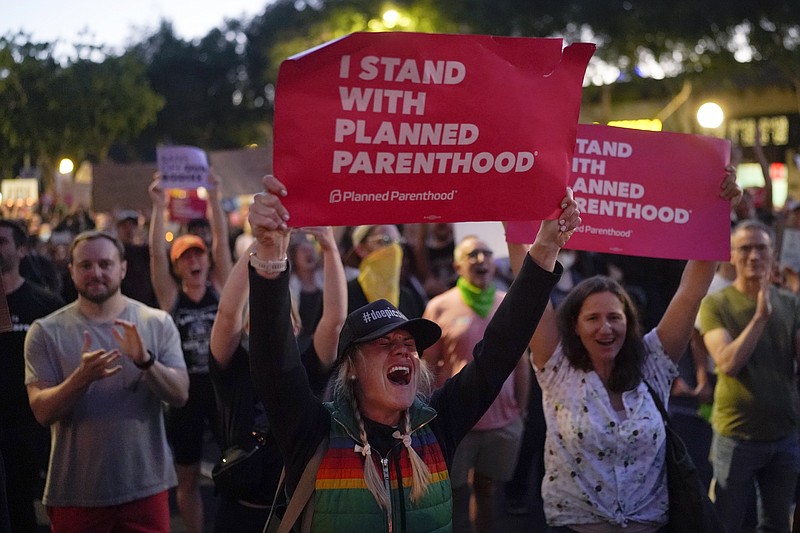NEW ORLEANS -- The fall of Roe v. Wade shifted the battleground over abortion to courthouses around the country Monday, as one side sought quickly to put statewide bans into effect and the other tried to stop or delay such measures.
The U.S. Supreme Court's decision Friday to end constitutional protection for abortion opened the gates for a wave of litigation from all sides.
Temporary delays were successful in Louisiana and Utah after state judges issued orders Monday that blocked abortion bans in those states from going into effect, while a federal judge in South Carolina said a law restricting abortions after six weeks of pregnancy would take effect immediately there.
Much of Monday's court activity focused on "trigger laws," adopted in 13 states that were designed to take effect swiftly upon last week's Supreme Court ruling.
Rulings came swiftly in Utah and Louisiana. A Utah judge on Monday temporarily blocked that state's near-total abortion ban after Planned Parenthood challenged a trigger law there that contains narrow exceptions.
In Louisiana, a judge in New Orleans temporarily blocked enforcement of the state's trigger law ban on abortion, after abortion rights activists argued that it is unclear.
The ruling is in effect pending a July 8 hearing. At least one of the state's three abortion clinics said it would resume procedures today.
"We're going to do what we can," said Kathaleen Pittman, administrator of Hope Medical Group for Women in Shreveport. "It could all come to a screeching halt."
Louisiana Attorney General Jeff Landry, a Republican and staunch abortion opponent, vowed to fight the judge's ruling and enforce the law.
"We would remind everyone that the laws that are now in place were enacted by the people through State Constitutional Amendments and the LA Legislature," Landry tweeted Monday.
The plaintiffs in the lawsuit filed in state court don't deny that the state can now ban abortion. Instead, they contend that state law is unclear on whether it bans an abortion before a fertilized egg implants in the uterus.
While the law provides an exception for "medically futile" pregnancies in cases of fetuses with lethal abnormalities, the plaintiffs noted that the law gives no definition of the term.
Also Monday, abortion rights advocates asked a Florida judge to block a new law there that bans the procedure after 15 weeks with some exceptions and is set to take effect this week. A ruling on that is expected Thursday.
Abortion rights activists also went to court Monday to try to fend off restrictions in Texas, Idaho, Kentucky and Mississippi -- the state at the center of the Supreme Court ruling.
The American Civil Liberties Union of Arizona filed an emergency motion there on Saturday seeking to block a 2021 law they worry can be used to halt all abortions. The challenge filed in Arizona, where most providers stopped offering abortions, said the legal questions are urgent.
Even if abortions resume in weeks or months, the plaintiffs said, "patients may be at greater risk of medical complications or may lose access to abortion altogether as a result of the delay."
LAWSUITS BUY TIME
In Friday's ruling, the Supreme Court left it to the states to decide whether to allow abortion. As of Saturday, abortion services had stopped in at least 11 states -- either because of state laws or confusion over them.
In some cases, the lawsuits may only buy time. Even if courts block some restrictions from taking hold, lawmakers in many conservative states could move quickly to address any flaws cited.
Around the country, challenges to other trigger laws could be made on the grounds that the conditions to impose the bans have not been met, or that it was improper for a past legislature to bind the current one.
Now that the high court has ruled that the U.S. Constitution does not guarantee the right to an abortion, abortion rights supporters will make the case that their state constitutions protect such a right.
A judge heard arguments on that issue Monday in Florida, where attorneys tried to block a new law from going into effect Friday. The ban beyond 15 weeks has exceptions to save the pregnant woman's life or prevent physical harm or in cases where the fetus has a fatal abnormality.
The ACLU of Florida argued that the law violates the Florida Constitution.
James Bopp Jr., general counsel for the National Right to Life Committee, said the wave of suits from advocates is not surprising. But he said the Supreme Court ruling should preclude abortion rights supporters from prevailing in any federal challenges.
He called efforts based on state constitutions "fanciful."
Still, other cases could be filed as states try to sort out whether abortion bans in place before Roe was decided apply now that there is no federal protection for abortion.
For instance, Wisconsin passed a law in 1849 banning abortions except to save the life of the mother. Attorney General Josh Kaul, a Democrat, said he does not believe it is enforceable.
Abortion opponents have called on lawmakers to impose a new ban. In the meantime, Planned Parenthood of Wisconsin said it immediately suspended all abortions.
In Michigan, Planned Parenthood challenged a 1931 abortion ban ahead of last week's Supreme Court ruling.
In May, a judge said the ban could not be enforced because it violates the state's constitution. Abortion rights supporters are now trying to get a proposed state constitutional amendment on the ballot in November to protect abortion and birth control.
Information for this article was contributed by Anthony Izaguirre and staff members of The Associated Press.
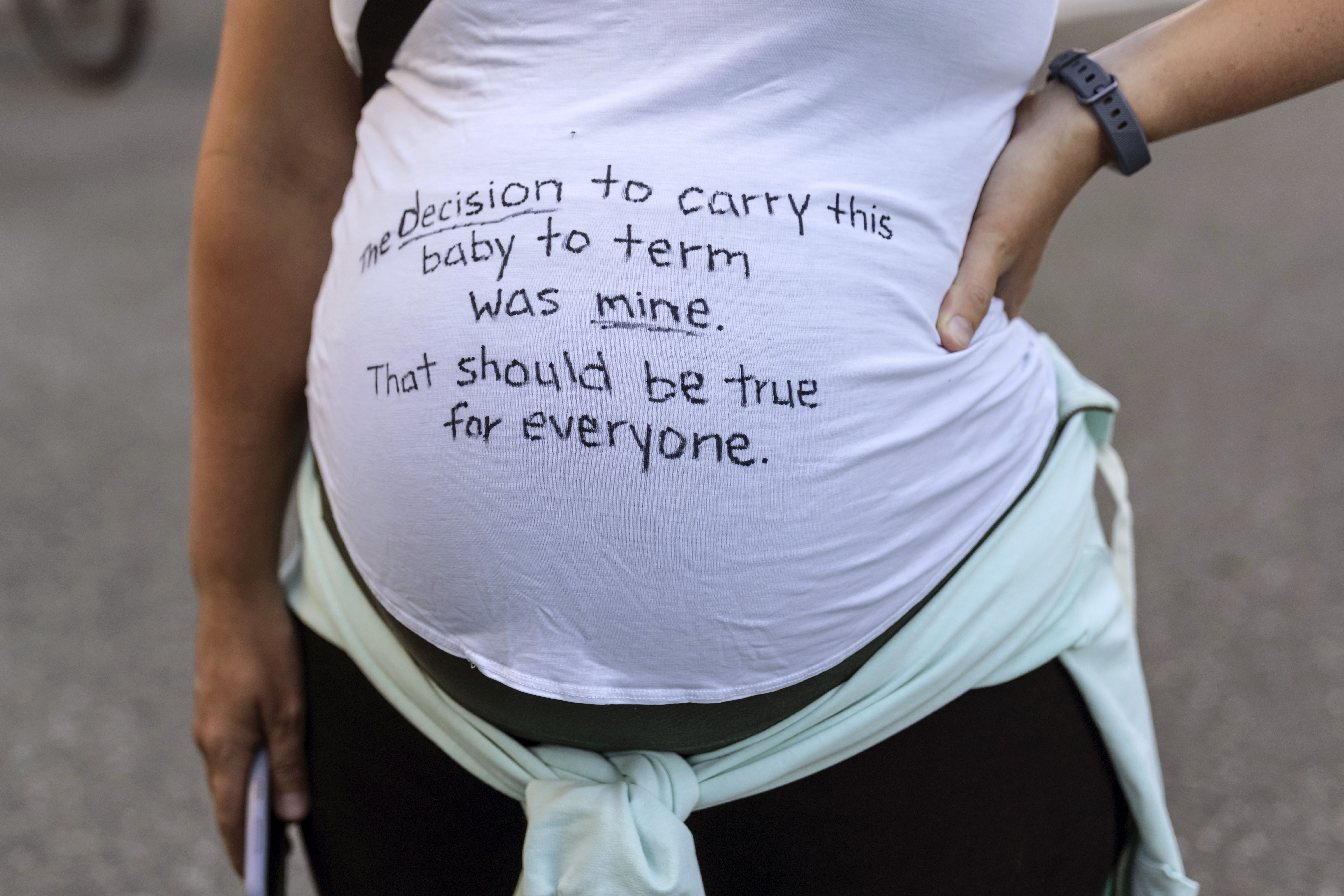 A pregnant protester is pictured with a message on her shirt in support of abortion rights during a march, Friday, June 24, 2022, in Seattle. The U.S. Supreme Court's decision to end constitutional protections for abortion has cleared the way for states to impose bans and restrictions on abortion — and will set off a series of legal battles. (AP Photo/Stephen Brashear)
A pregnant protester is pictured with a message on her shirt in support of abortion rights during a march, Friday, June 24, 2022, in Seattle. The U.S. Supreme Court's decision to end constitutional protections for abortion has cleared the way for states to impose bans and restrictions on abortion — and will set off a series of legal battles. (AP Photo/Stephen Brashear)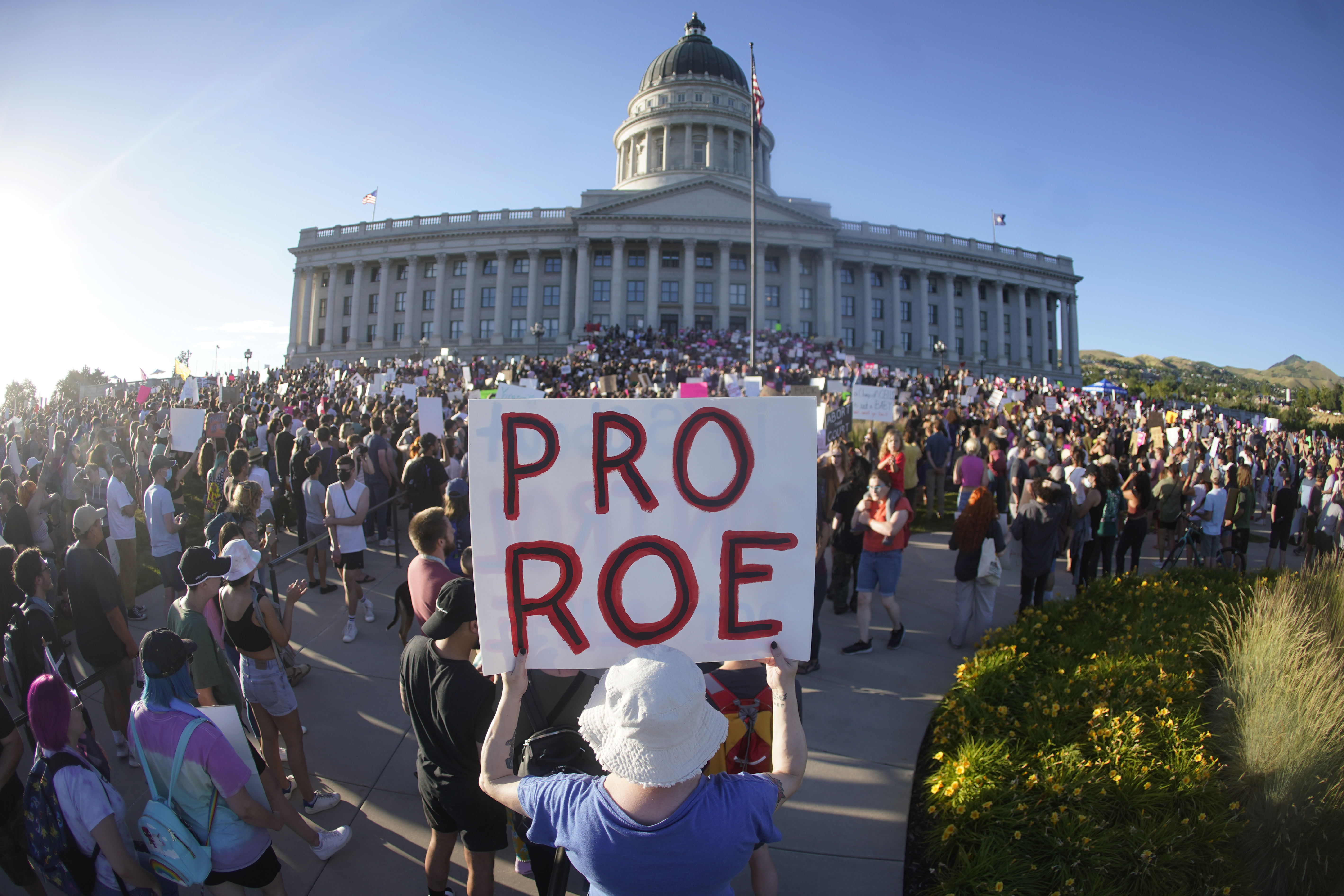 People attend an abortion-rights protest at the Utah State Capitol in Salt Lake City after the Supreme Court overturned Roe v. Wade, Friday, June 24, 2022. The U.S. Supreme Court's decision to end constitutional protections for abortion has cleared the way for states to impose bans and restrictions on abortion — and will set off a series of legal battles. (AP Photo/Rick Bowmer)
People attend an abortion-rights protest at the Utah State Capitol in Salt Lake City after the Supreme Court overturned Roe v. Wade, Friday, June 24, 2022. The U.S. Supreme Court's decision to end constitutional protections for abortion has cleared the way for states to impose bans and restrictions on abortion — and will set off a series of legal battles. (AP Photo/Rick Bowmer)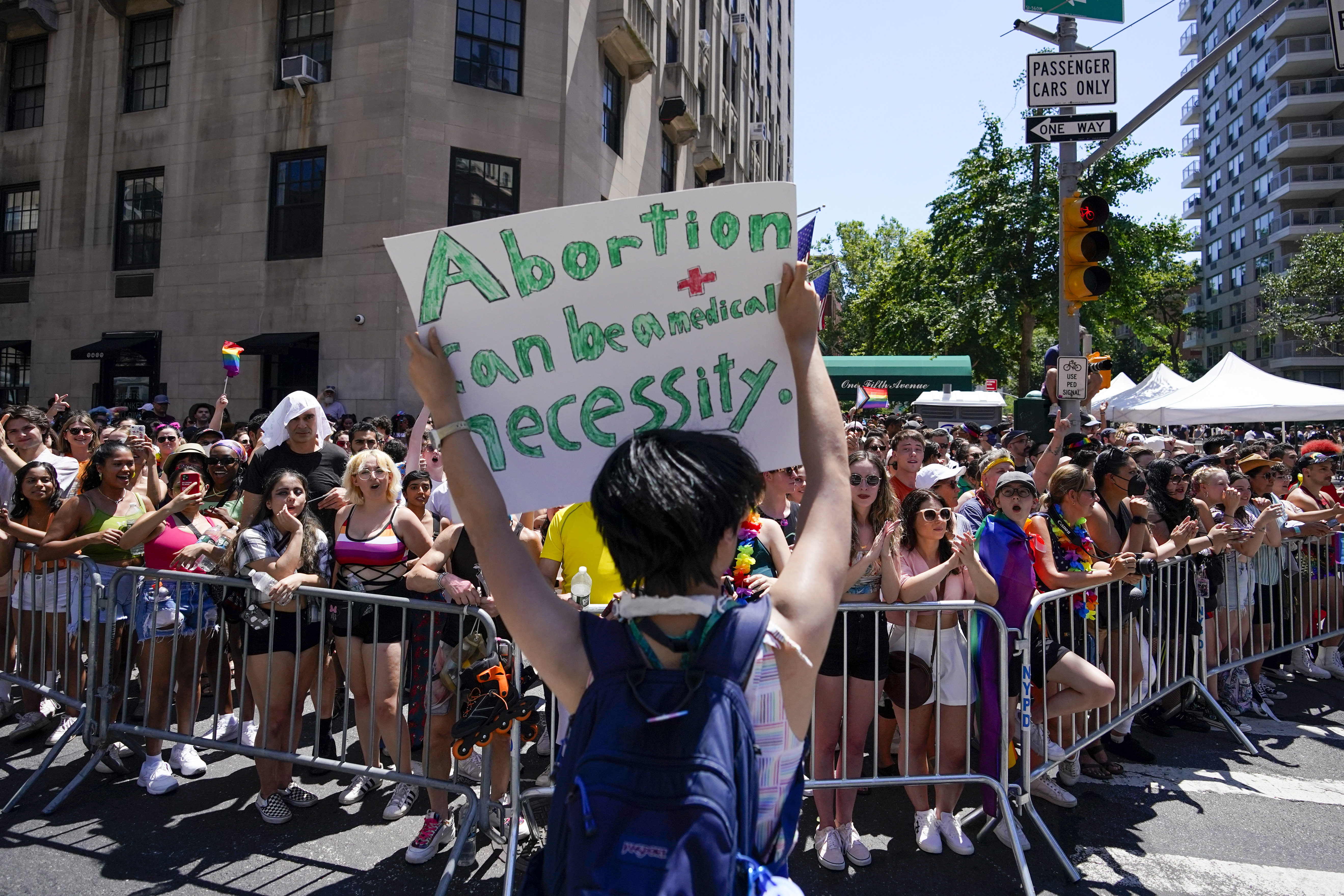 A reveler holds a sign showing support of abortion rights as she marches down Fifth Avenue during the annual NYC Pride March, Sunday, June 26, 2022, in New York. The U.S. Supreme Court's decision to end constitutional protections for abortion has cleared the way for states to impose bans and restrictions on abortion — and will set off a series of legal battles. (AP Photo/Mary Altaffer)
A reveler holds a sign showing support of abortion rights as she marches down Fifth Avenue during the annual NYC Pride March, Sunday, June 26, 2022, in New York. The U.S. Supreme Court's decision to end constitutional protections for abortion has cleared the way for states to impose bans and restrictions on abortion — and will set off a series of legal battles. (AP Photo/Mary Altaffer)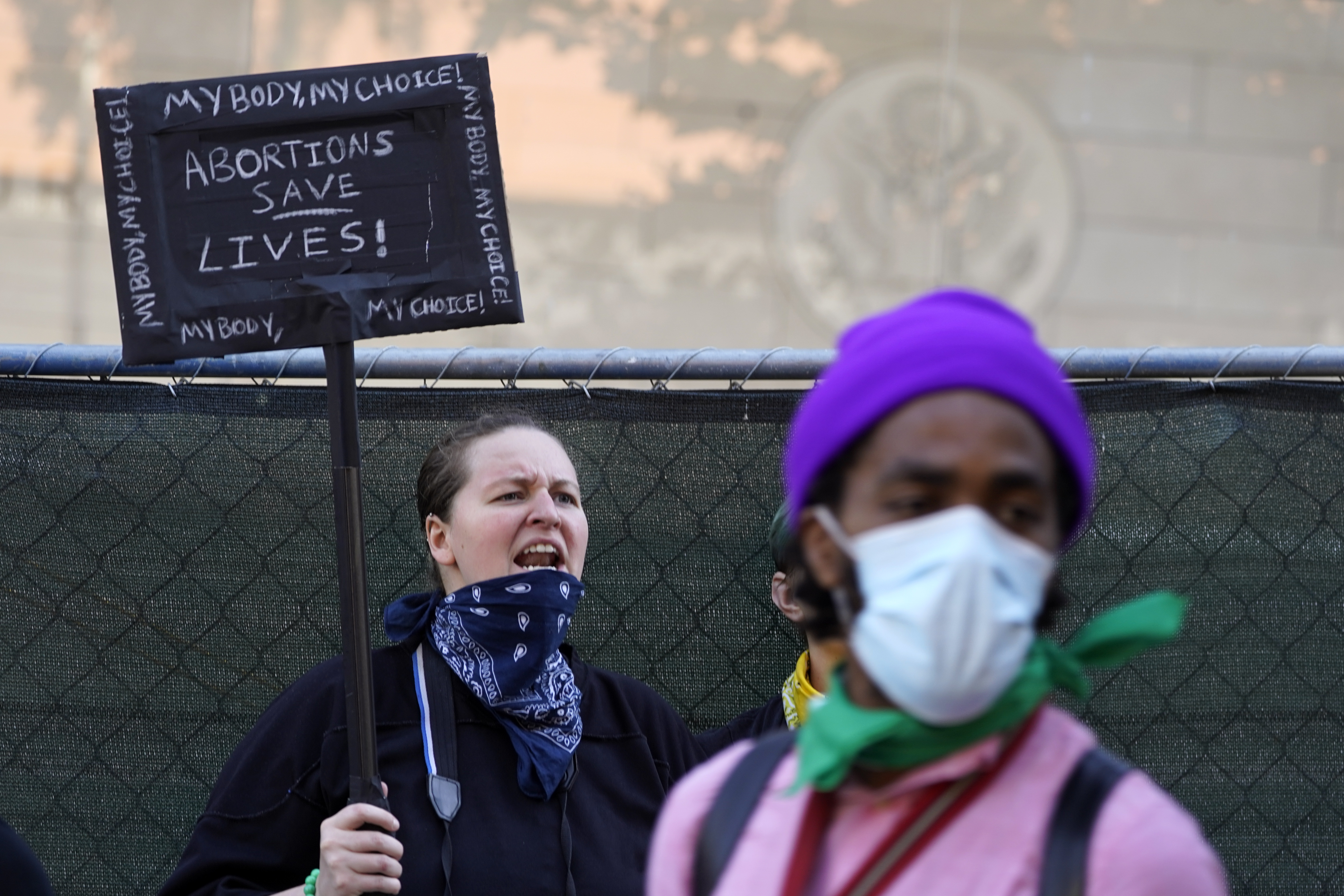 Supporters of abortion rights hold a rally outside the First Street U.S. Courthouse, Central District of California, in downtown Los Angeles, Saturday, June 25, 2022. The U.S. Supreme Court's decision to end constitutional protections for abortion has cleared the way for states to impose bans and restrictions on abortion — and will set off a series of legal battles. (AP Photo/Damian Dovarganes)
Supporters of abortion rights hold a rally outside the First Street U.S. Courthouse, Central District of California, in downtown Los Angeles, Saturday, June 25, 2022. The U.S. Supreme Court's decision to end constitutional protections for abortion has cleared the way for states to impose bans and restrictions on abortion — and will set off a series of legal battles. (AP Photo/Damian Dovarganes)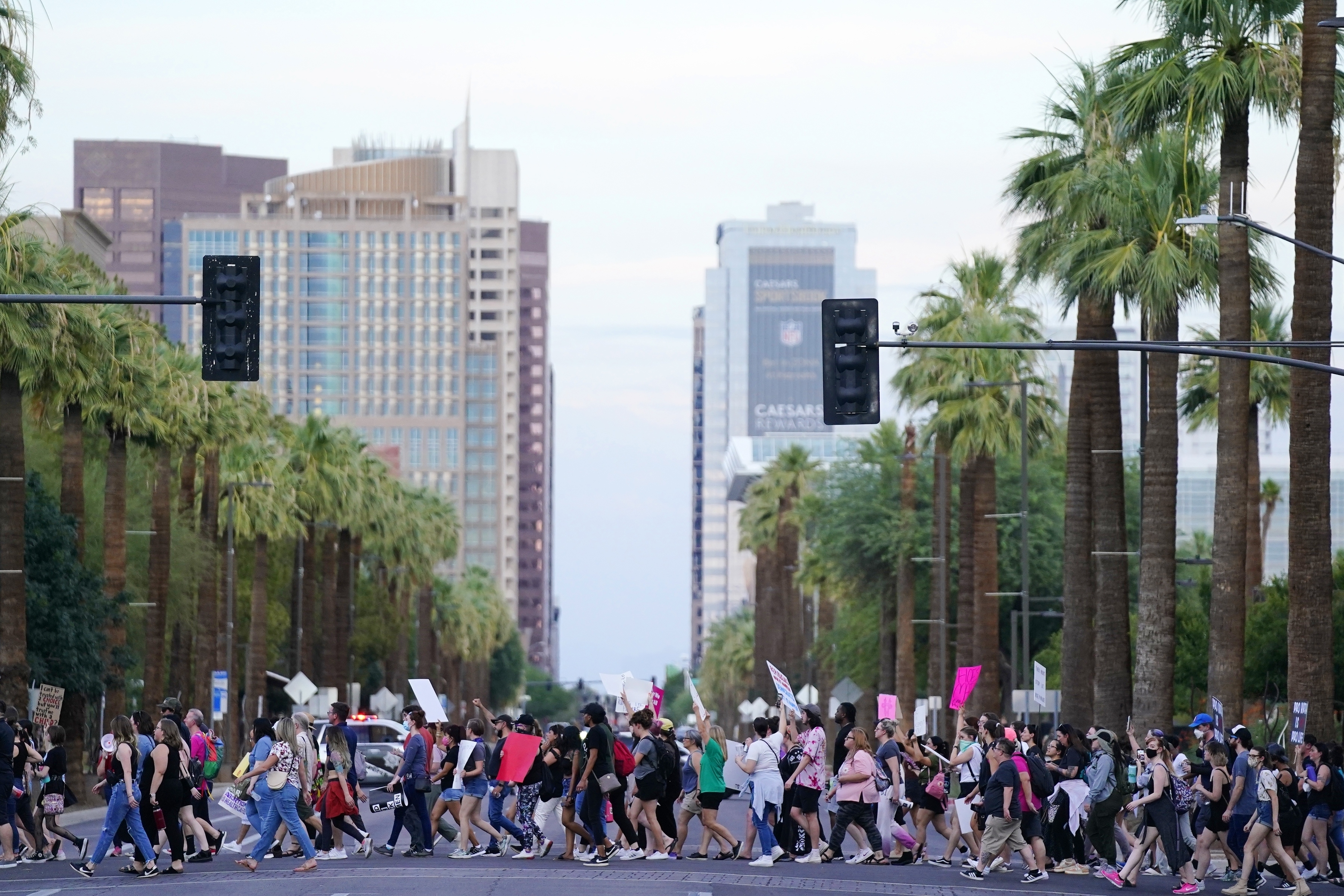 Protesters march near downtown Phoenix after the Supreme Court overturned Roe v. Wade, Friday, June 24, 2022. The U.S. Supreme Court's decision to end constitutional protections for abortion has cleared the way for states to impose bans and restrictions on abortion — and will set off a series of legal battles. (AP Photo/Ross D. Franklin)
Protesters march near downtown Phoenix after the Supreme Court overturned Roe v. Wade, Friday, June 24, 2022. The U.S. Supreme Court's decision to end constitutional protections for abortion has cleared the way for states to impose bans and restrictions on abortion — and will set off a series of legal battles. (AP Photo/Ross D. Franklin)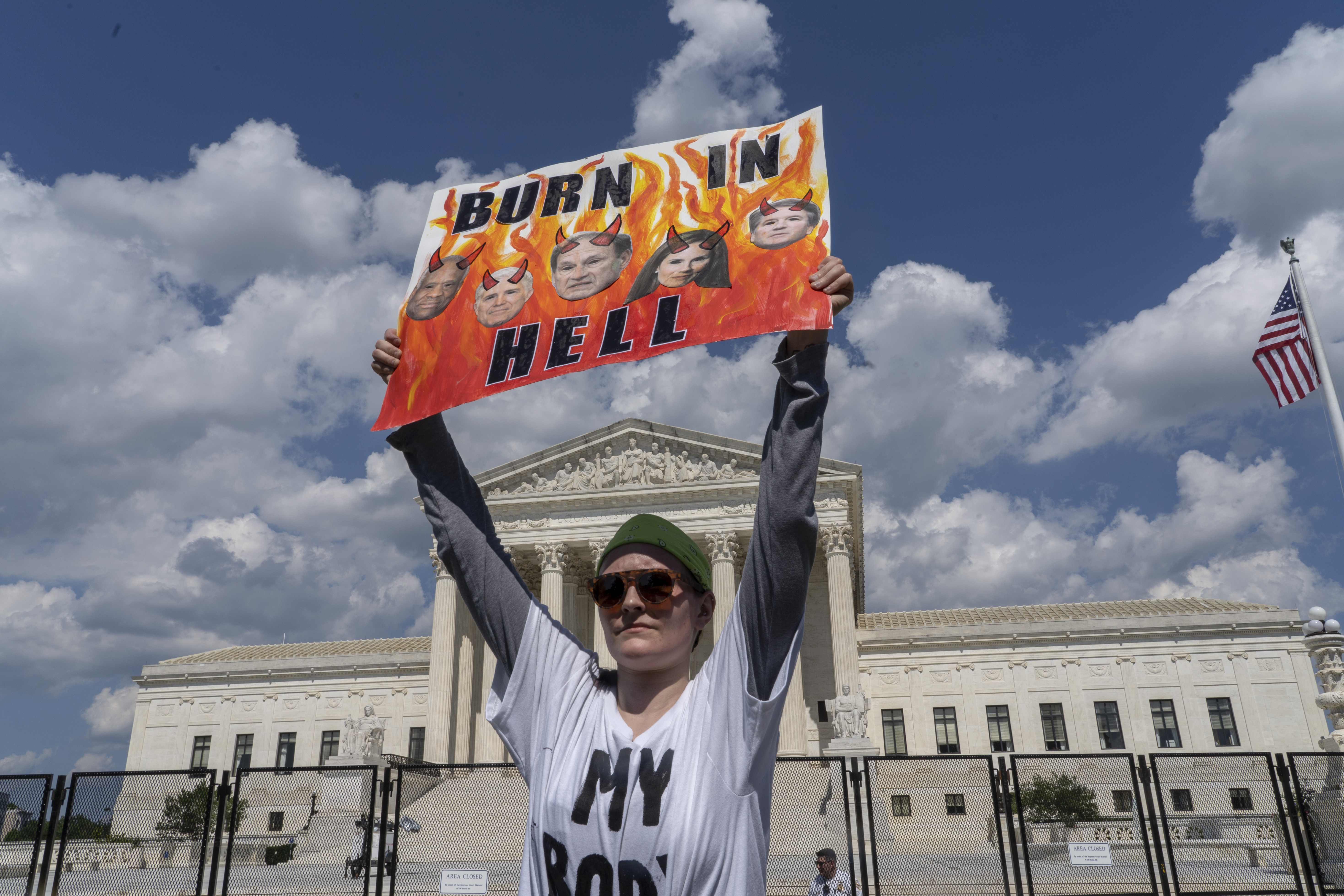 An abortion-rights protester displays a placard during a demonstration outside the Supreme Court in Washington, Saturday, June 25, 2022. The U.S. Supreme Court's decision to end constitutional protections for abortion has cleared the way for states to impose bans and restrictions on abortion — and will set off a series of legal battles. (AP Photo/Gemunu Amarasinghe)
An abortion-rights protester displays a placard during a demonstration outside the Supreme Court in Washington, Saturday, June 25, 2022. The U.S. Supreme Court's decision to end constitutional protections for abortion has cleared the way for states to impose bans and restrictions on abortion — and will set off a series of legal battles. (AP Photo/Gemunu Amarasinghe) People attend an abortion-rights protest at the Utah State Capitol, Friday, June 24, 2022, in Salt Lake City. The U.S. Supreme Court's decision to end constitutional protections for abortion has cleared the way for states to impose bans and restrictions on abortion — and will set off a series of legal battles.(AP Photo/Rick Bowmer)
People attend an abortion-rights protest at the Utah State Capitol, Friday, June 24, 2022, in Salt Lake City. The U.S. Supreme Court's decision to end constitutional protections for abortion has cleared the way for states to impose bans and restrictions on abortion — and will set off a series of legal battles.(AP Photo/Rick Bowmer)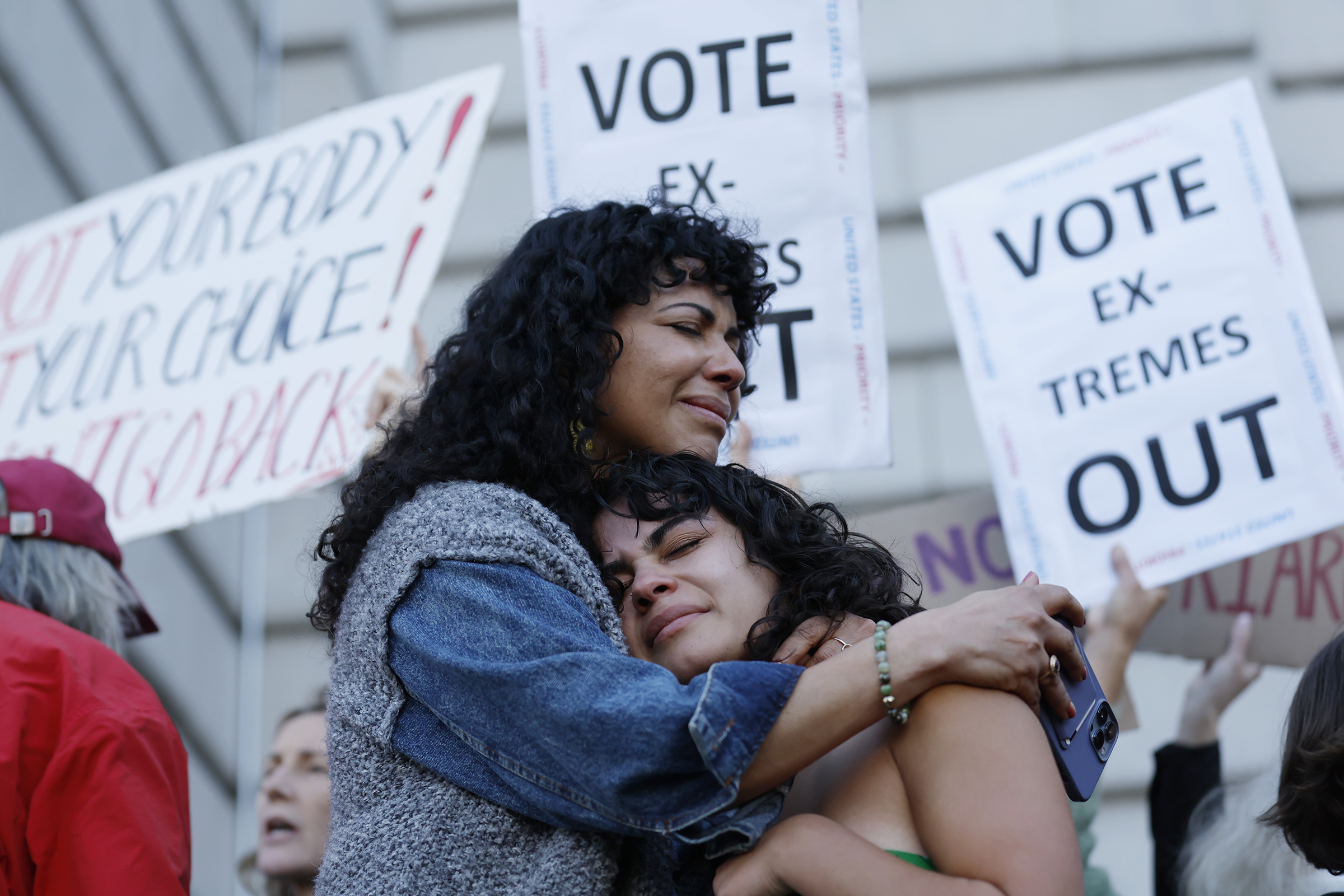 Mitzi Rivas, left, hugs her daughter Maya Iribarren during an abortion-rights protest at City Hall in San Francisco following the Supreme Court's decision to overturn Roe v. Wade, Friday, June 24, 2022. The U.S. Supreme Court's decision to end constitutional protections for abortion has cleared the way for states to impose bans and restrictions on abortion — and will set off a series of legal battles. (AP Photo/Josie Lepe)
Mitzi Rivas, left, hugs her daughter Maya Iribarren during an abortion-rights protest at City Hall in San Francisco following the Supreme Court's decision to overturn Roe v. Wade, Friday, June 24, 2022. The U.S. Supreme Court's decision to end constitutional protections for abortion has cleared the way for states to impose bans and restrictions on abortion — and will set off a series of legal battles. (AP Photo/Josie Lepe)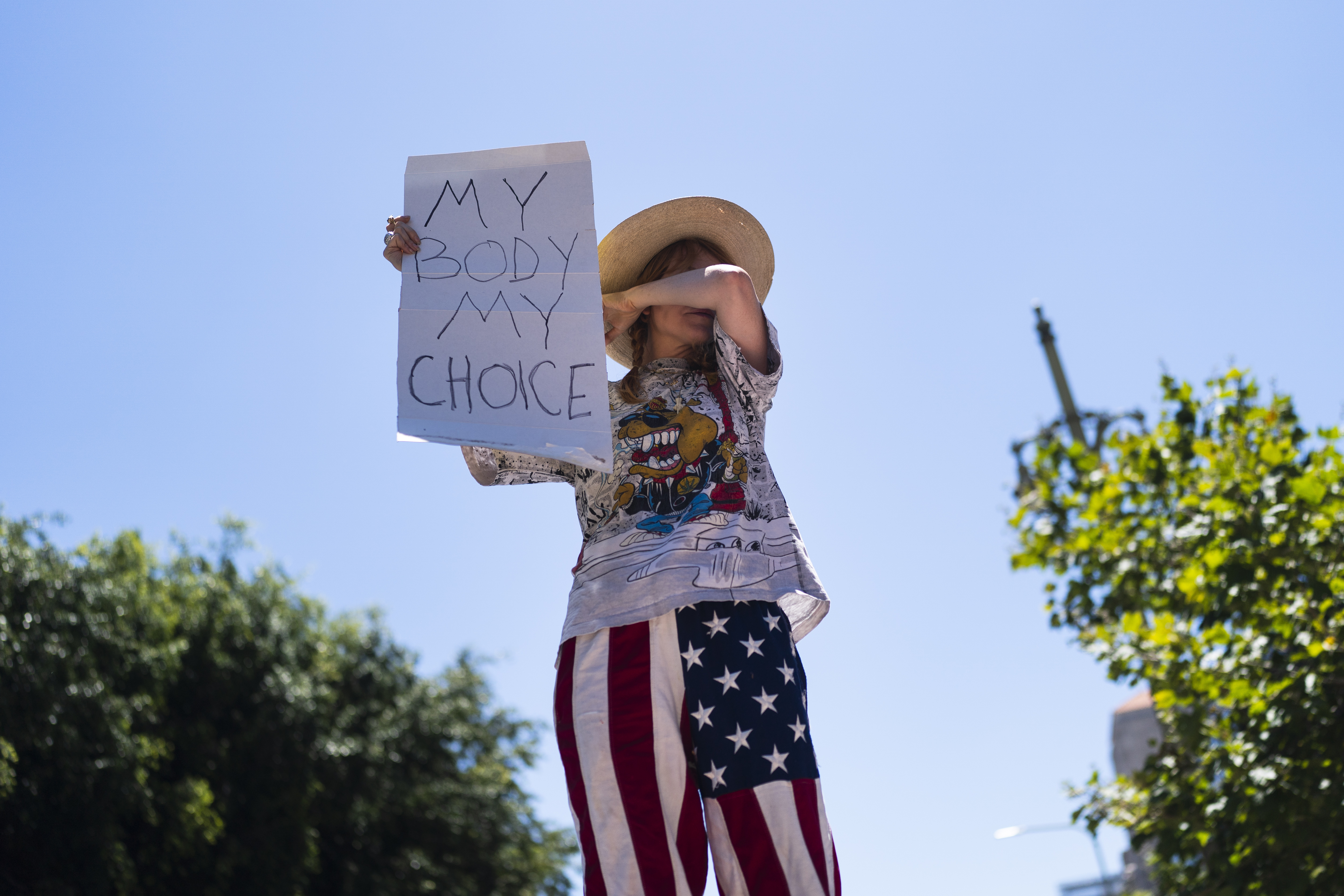 Abortion-rights advocate Eleanor Wells, 34, wipes her tears during a protest in Los Angeles, Friday, June 24, 2022. The U.S. Supreme Court's decision to end constitutional protections for abortion has cleared the way for states to impose bans and restrictions on abortion — and will set off a series of legal battles. (AP Photo/Jae C. Hong)
Abortion-rights advocate Eleanor Wells, 34, wipes her tears during a protest in Los Angeles, Friday, June 24, 2022. The U.S. Supreme Court's decision to end constitutional protections for abortion has cleared the way for states to impose bans and restrictions on abortion — and will set off a series of legal battles. (AP Photo/Jae C. Hong)